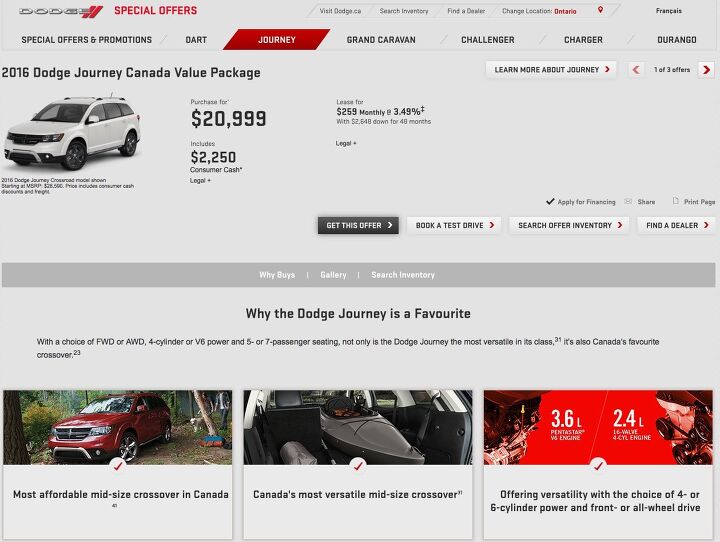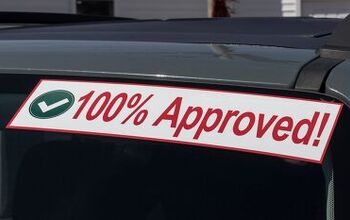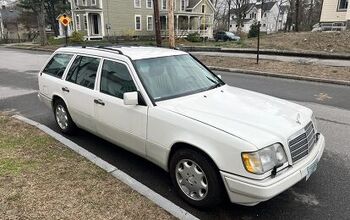Ignore FCA's Claims: The Dodge Journey Isn't, Wasn't, And Won't Soon Be "Canada's Favourite Crossover"
It was early 2014 when an Albertan car salesman drew my attention to a claim he noticed in commercials and promotional material from Fiat Chrysler Automobiles Canada. The Dodge Journey, they said, was Canada’s No. 1 selling crossover.
It wasn’t. But at the time, FCA was using some hilariously inappropriate segmentation from R.L. Polk Canada, Inc. to support the claim.
FCA Canada’s more recent Journey-related claim uses altered language to make a similar-sounding statement. FCA calls the Journey, “Canada’s favourite crossover.”
The Dodge Journey is not Canada’s favourite crossover. The Dodge Journey never was Canada’s favourite crossover. Based on current trend lines, the Dodge Journey does not stand a chance of soon becoming Canada’s favourite crossover.
Despite its advanced age, there’s no denying that the Dodge Journey has historically outperformed sales expectations in Canada. While not highly regarded by critics — though given due credit for its value proposition — the Journey has produced nearly one-quarter of its U.S./Canadian volume north of the border, where one-tenth of all U.S./Canadian auto sales are produced. As a result, the Journey has certainly been among Canada’s most popular utility vehicles.
While last year’s all-time record U.S. Journey sales propelled the Dodge into 20th spot among SUVs/crossovers, the Journey has ranked as high as No. 2 in Canada. That was in 2011, when the Ford Escape ended the year with 52-percent more sales than the Dodge Journey.
But on an annual basis, that’s as close as the Journey has ever been. The Journey fell to third spot in 2012, fourth in 2013, sixth in 2014, seventh in 2015. Through the first 11 months of 2016, the Journey ranks 12th among SUVs/crossovers, behind 10 CUVs and the Jeep Wrangler.
Of course, definitions matter. An SUV to you may be a crossover to me. A CUV to FCA may be a SAV at BMW. But the general populace would surely agree that the vehicles which regularly outsell the Dodge Journey in Canada — 2016 will be the fourth consecutive year in which the Escape, Honda CR-V, and Toyota RAV4 have all outsold the Journey — are just as deserving of a “crossover” definition as the Dodge Journey.
But FCA sees things differently. Very differently.
First, go back to the aforementioned claim from a few years back. Supporting material obtained at the time by GoodCarBadCar.net from the Alberta Motor Vehicle Industry showed that FCA’s “No.1 selling crossover” claim was based on a very narrow definition of the term, “crossover.”
The Buick Enclave, Cadillac SRX, Ford Flex, GMC Acadia, Hyundai Veracruz, Infiniti QX70, Mazda CX-9, Nissan Murano, Subaru Tribeca, Toyota Venza, Volvo XC70, and Volvo XC90 were listed as “full-size crossovers” while the Ford Edge, Lincoln MKX, Infiniti QX50, Mercedes-Benz GLK, and Volvo XC60 were listed as “midsize crossovers.” Where were the Ford Escape, Honda CR-V, and Toyota RAV4 listed? With midsize SUVs, naturally, along with the Lexus RX, Nissan Xterra, Toyota FJ Cruiser, and an eclectic mix of utility vehicles from across a wide spectrum.
Now, FCA is claiming that the Dodge Journey is “Canada’s favourite crossover.” The claim is supported by the following fine print: “Based on IHS Automotive: Polk Canadian Vehicles in Operation data as of July 1st, 2015 for Crossover Segments as defined by FCA Canada Inc.” Take note, FCA isn’t referring to current sales data but rather 15-month-old “vehicles in operation” data. Take special note: the claim made is licensed by FCA from R.L. Polk/IHS Automotive. And take further note of the real problem relating to the closing words: “crossover segments as defined by FCA Canada Inc.”
How does FCA Canada define the crossover segment? Small crossovers, FCA told TTAC yesterday, include the Fiat 500X, Jeep Renegade, Mini Countryman, Mini Paceman, Buick Encore, Honda HR-V, Mazda CX-3, and Nissan Juke. Compact crossovers, why, there are only a couple according to FCA: Mazda CX-5 and Subaru Crosstrek. Full-size crossovers: Buick Enclave, Chevrolet Traverse, Ford Flex, GMC Acadia, Honda Crosstour, Mazda CX-9, Nissan Murano, Subaru Tribeca, Toyota Venza.
And then there’s the Journey’s “midsize crossover” category: Buick Envision, Dodge Journey, Ford Edge, Nissan Rogue, Subaru Outback.
RAV4? Escape? CR-V? Cherokee? Tucson? Santa Fe? Equinox? Nowhere to be found.
More by Timothy Cain
Latest Car Reviews
Read moreLatest Product Reviews
Read moreRecent Comments
- HotRod Not me personally, but yes - lower prices will dramatically increase the EV's appeal.
- Slavuta "the price isn’t terrible by current EV standards, starting at $47,200"Not terrible for a new Toyota model. But for a Vietnamese no-name, this is terrible.
- Slavuta This is catch22 for me. I would take RAV4 for the powertrain alone. And I wouldn't take it for the same thing. Engines have history of issues and transmission shifts like glass. So, the advantage over hard-working 1.5 is lost.My answer is simple - CX5. This is Japan built, excellent car which has only one shortage - the trunk space.
- Slavuta "Toyota engineers have told us that they intentionally build their powertrains with longevity in mind"Engine is exactly the area where Toyota 4cyl engines had big issues even recently. There was no longevity of any kind. They didn't break, they just consumed so much oil that it was like fueling gasoline and feeding oil every time
- Wjtinfwb Very fortunate so far; the fleet ranges from 2002 to 2023, the most expensive car to maintain we have is our 2020 Acura MDX. One significant issue was taken care of under warranty, otherwise, 6 oil changes at the Acura dealer at $89.95 for full-synthetic and a new set of Michelin Defenders and 4-wheel alignment for 1300. No complaints. a '16 Subaru Crosstrek and '16 Focus ST have each required a new battery, the Ford's was covered under warranty, Subaru's was just under $200. 2 sets of tires on the Focus, 1 set on the Subie. That's it. The Focus has 80k on it and gets synthetic ever 5k at about $90, the Crosstrek is almost identical except I'll run it to 7500 since it's not turbocharged. My '02 V10 Excursion gets one oil change a year, I do it myself for about $30 bucks with Synthetic oil and Motorcraft filter from Wal-Mart for less than $40 bucks. Otherwise it asks for nothing and never has. My new Bronco is still under warranty and has no issues. The local Ford dealer sucks so I do it myself. 6 qts. of full syn, a Motorcraft cartridge filter from Amazon. Total cost about $55 bucks. Takes me 45 minutes. All in I spend about $400/yr. maintaining cars not including tires. The Excursion will likely need some front end work this year, I've set aside a thousand bucks for that. A lot less expensive than when our fleet was smaller but all German.



































Comments
Join the conversation
I'm guessing the Dodge Journey would stand a better chance of topping a list of vehicles with the highest number/ percentage of incidences of buyer's remorse than of anyone's favorite vehicle - in ANY category. Something about the bitterness of poor quality remaining long after the sweetness of low price....
It's rather like an obviously fake phone scam call. The obviously fake claims aren't a flaw in the marketing, it's a feature. Only the fish dumb enough to eat the bare rusting hook will respond to it. We self filter for the scam, and they don't waste time pitching to someone who will never fall for the end game.